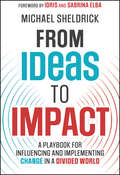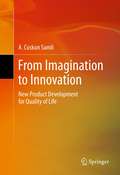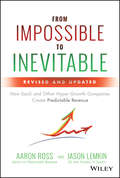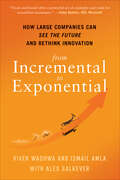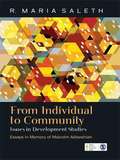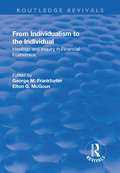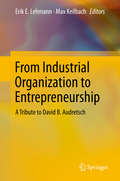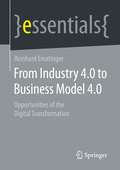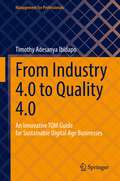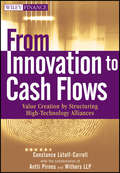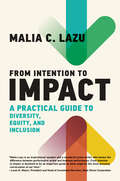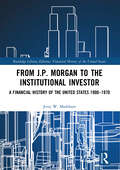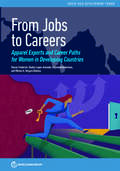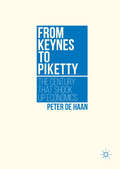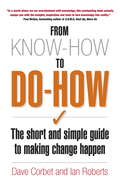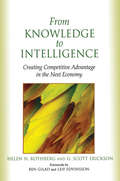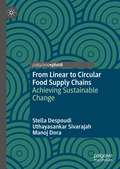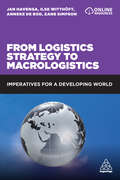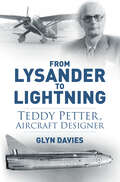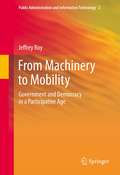- Table View
- List View
From Ideas to Impact: A Playbook for Influencing and Implementing Change in a Divided World
by Michael SheldrickAccelerate your real-world, social impact by driving systemic policy changes As Co-Founder of Global Citizen—an international education and advocacy organization with the mission to end extreme poverty worldwide—Michael Sheldrick has worked with governments, businesses, foundations, the artist community, and everyday citizens to distribute over $40 billion around the world over the past decade. Now, in From Ideas to Impact: A Playbook for Influencing and Implementing Change in a Divided World, he delivers an inspiring and insightful discussion on how to implement social impact by driving policy change. This book reveals key characteristics of successful policy entrepreneurs - visionaries bridging the gap between promises and real-world outcomes. They are practical implementers who put impact first, resisting the urge to pursue the instant dopamine boost that comes from simply winning arguments at all costs. They are connectors and networkers who build diverse coalitions and broker win-win solutions to address our current implementation crisis. An indispensable guide for individual changemakers, philanthropists, corporate social responsibility (CSR) practitioners, environmental, social, and governance (ESG) professionals, policymakers, corporate foundations, and higher education students, From Ideas to Impact: A Playbook for Influencing and Implementing Change in a Divided World, features: An overview of pressing challenges to avoid, including an obsession with winning arguments at the expense of results, demands for unwavering tribal loyalty, and a counterproductive aversion to negotiation. An eight-step playbook offering tools to master policy entrepreneurship, foster cooperation, build bridges, and drive policy implementation beyond stagnation, conflict, and polarization. Diverse policy entrepreneurs and examples spanning historical movements like the Transatlantic Slave Trade and FDR’s New Deal to contemporary battles for climate justice, coal community transitions, and grassroots gender equality efforts. At its core, this uplifting book instills hope that change is achievable despite our divisions. It showcases how individuals at all levels pursue systemic policy change through united voices, cooperation, and solidarity. Sheldrick equips readers with the tools to craft impactful narratives that can inspire countless more success stories, reinforcing the idea that we are not prisoners of fate and that actual change begins with us.
From Imagination to Innovation
by A. Coskun SamliIt is impossible to measure the full economic and psychological benefits of the sewing machine, the polio vaccine, or the Internet. What we know is that these products have changed our lives for the better, generating net benefits well beyond the metric of corporate profits. As forces such as financial market volatility and fragmented markets demonstrate the fragility of the global economy, the imperative to develop products and services that contribute to the well-being of the many--rather than the few--is more pronounced than ever. In this book, A. Coskun Samli explores this imperative of an "innovation culture" and how it can be encouraged at all levels, from the individual to the nation or region. He argues that without a global innovation culture, committed to generating socially valuable products, we are likely to face a deteriorating quality of life, as wealth is concentrated at the top. Integrating insights from management, economics, policy, and psychology, Samli demonstrates how creativity can be channeled into innovation and innovation can be channeled, in turn, toward economic development. He discusses how national policies can be oriented toward encouraging such socially beneficial innovations as sustainable energy, communication technology, and medical discoveries. The aim is to promote the development of products and services that improve quality of life and generate profits for those who invest in them. He argues that all innovations, whether radical or incremental, must demonstrate social value in order to be truly profitable.
From Imitation to Innovation: Zongshen Industrial Group
by Nancy Hua Dai Willy ShihAs Zuo Zongshen drove the transformation of the Zongshen Industrial Group from an early imitator in the motorcycle business to a company that increasingly focused on innovation as a way to get out of the hyper-competitive commodity business, he continually faced new challenges. The company had become a leader in gasoline powered motorcycles and small gas engines, but increasing taxes and restrictions on the use of motorcycles in congested urban areas had spawned a new industry, electric motorbikes, which posed a threat to the company's core business. Sourcing the technology for these e-bikes, and hiring and retaining the management and creative talent the company needed, were continuing challenges. The case traces the development of capabilities in the Zongshen Industrial Group, how it used the early imitation phase to foster rapid technological learning and upgrading, and how it used a unique corporate structure and listing strategy to finance the acquisition of important technologies.
From Impossible to Inevitable: How SaaS and Other Hyper-Growth Companies Create Predictable Revenue
by Aaron Ross Jason LemkinBreak your revenue records with Silicon Valley’s “growth bible” “This book makes very clear how to get to hyper-growth and the work needed to actually get there” Why are you struggling to grow your business when everyone else seems to be crushing their goals? If you needed to triple revenue within the next three years, would you know exactly how to do it? Doubling the size of your business, tripling it, even growing ten times larger isn't about magic. It's not about privileges, luck, or working harder. There's a template that the world's fastest growing companies follow to achieve and sustain much, much faster growth. From Impossible to Inevitable details the hypergrowth playbook of companies like Hubspot, Salesforce.com (the fastest growing multibillion dollar software company), and EchoSign—aka Adobe Document Services (which catapulted from $0 to $144 million in seven years). Whether you have a $1 billion or a $100,000 business, you can use the same insights as these notable companies to learn what it really takes to break your own revenue records. Pinpoint why you aren’t growing faster Understand what it takes to get to hypergrowth Nail a niche (the #1 missing growth ingredient) What every revenue leader needs to know about building a scalable sales team There’s no time like the present to surpass plateaus and get off of the up-and-down revenue rollercoaster. Find out how now!
From Incremental to Exponential: How Large Companies Can See the Future and Rethink Innovation
by Vivek Wadhwa Alex Salkever Ismail Amla&“This timely book reminds us that innovation is agnostic about where it's created.&”—Satya Nadella, CEO, MicrosoftOver and over, we see big legacy businesses getting beaten to the punch by energetic little start-ups. It seems like innovation can come from only the bottom up or from the outside in. But tech experts Vivek Wadwha and Ismail Amla are here to tell you that &“big equals slow and stodgy&” is a myth. Based on decades of experience working with both the world's leading brands and disruptive start-ups, this book explores the opportunity legacy companies have to create new markets, supercharge growth, and remake their businesses by combining the mindset and tool belt of start-ups with the benefits of incumbency: boatloads of customer data, decades of brand equity, robust distribution channels, enormous financial assets, and more. Wadhwa and Amla go deeply into why the pace and dynamics of innovation have changed so dramatically in recent years and show how companies can overcome obstacles like the Eight Deadly Sins of Stasis. Equally important, they provide a playbook on how to use their insights in your own company, team, or career. This fast-paced, anecdote-rich story rethinks modern innovation—a book every manager, executive, and ambitious employee will want to read.
From Individual to Community
by Rathinasamy Maria SalethFrom Individual to Community brings together a set of papers that provides critical commentaries on various facets of the ongoing process of development. The book addresses issues that concern developing countries--such as globalization, economic growth, rural transformation, gender equality, educational reforms and the Dalit movement--from a multidisciplinary perspective. Based on the theoretical framework of the normative principles, the book evaluates issues that are specifically relevant in the Indian context--rich versus poor, globalization versus sustainable development, and so on. Devoid of any ideological rigidity, this book is an unbiased exposition of the material as well as ideological positioning of globalization, development and change. This book also commemorates the birth centenary of Professor Malcolm Adiseshiah, former Deputy Director General of UNESCO and a Padma Bhushan awardee, who was also founder of Madras Institute of Development Studies.
From Individualism to the Individual: Ideology and Inquiry in Financial Economics (Routledge Revivals)
by George M. Frankfurter Elton G. McGounThis title was first published in 2002: From Individualism to the Individual treats finance as a social and cultural process, exploring the unseen side of academic discourse and the many obstacles the deeply entrenched elite puts in the way of alternative thinking. Opening with a detailed discussion of the role of ideology in the perpetuation of the limited methodological bias of the profession toward markets, the book then examines the more specific effects of such ideological limitations on theoretical and empirical research in finance. The authors develop alternative ways to examine finance both as a profession and as a field of inquiry. This book will be of particular value to researchers and practitioners working in finance, as well as those in other social science disciplines whose research relates to finance, culture and society.
From Industrial Organization to Entrepreneurship: A Tribute to David B. Audretsch
by Max Keilbach Erik E. LehmannThis book celebrates the contributions of David B. Audretsch, Distinguished Professor at the School of Public and Environment Affairs (SPEA) at Indiana University (USA), co-founder and co-editor of Small Business Economics, and former Director of the Entrepreneurship, Growth and Public Policy Group at the erstwhile Max Planck Institute of Economics (Jena, Germany). For his pioneering work, which explores the links between entrepreneurship, government policy, innovation, economic development, and global competitiveness, he has received the 2001 Global Award for Entrepreneurship Research from the Swedish Foundation for Small Business Research and the 2011 Schumpeter Prize from the University of Wuppertal (Germany).This volume features original contributions from over 50 leading scholars to map, analyze and evaluate the impact of Audretsch’s research on a broad spectrum of research fields, ranging from economics to entrepreneurship and geography. The development and evolution of key ideas which have significantly shaped theory and future research across these fields are also explored.
From Industry 4.0 to Business Model 4.0: Opportunities of the Digital Transformation (essentials)
by Reinhard EmatingerIn this essential you will learn how to use the changed rules of the game of Industry 4.0 and discover patterns for new business models. Reinhard Ematinger shows you how to describe your current business model in a structured way, sketch and test new business models and define the benefits for existing and new customers. Real and current examples accompany you through this book and questions support you in the transfer to application in your organization.This Springer essential is a translation of the original German 1st edition essentials, Von der Industrie 4.0 zum Geschäftsmodell 4.0 by Reinhard Ematinger, published by Springer Fachmedien Wiesbaden GmbH, part of Springer Nature in 2018.The translation was done with the help of artificial intelligence (machine translation by the service DeepL.com). A subsequent human revision was done primarily in terms of content, so that the book will read stylistically differently from a conventional translation. Springer Nature works continuously to further the development of tools for the production of books and on the related technologies to support the authors.
From Industry 4.0 to Quality 4.0: An Innovative TQM Guide for Sustainable Digital Age Businesses (Management for Professionals)
by Timothy Adesanya IbidapoThis book describes the development of quality over various stages, from product inspection, through quality control to the present ISO 9000 systems. It also highlights the advantages of the quality management system (QMS) standards and the need for certification by organizations and enterprises/firms interested in taking advantage of the various benefits of these standards to improve their systems and aid their survival in a globally competitive market. The author provides simplified information to enable even those hearing the word ''quality'' for the first time to be able to appreciate and understand the various quality management philosophies irrespective of their background and position.
From Innovation to Cash Flows
by Antti Pirnes Withers Llp Constance Lütolf-CarrollPraise for From Innovation to Cash Flows"Critically important topics for all entrepreneurs, new and experienced. Collaboration, intellectual property, and funding are described with depth and thoughtfulness. From Innovation to Cash Flows provides both the theoretical structure and the rich examples to serve as a great reference. Not to be missed!"--Cheryl A. Fragiadakis, Head of Technology Transfer and Intellectual Property Management, Lawrence Berkeley National Laboratory"From Innovation to Cash Flows is a unique book that covers many of the essentials to be successful as a biotechnology or high-tech entrepreneur. The combination of theory and practical examples adds direct business value. This comprehensive work will prevent any starting venture from making costly mistakes."--Jeroen Nieuwenhuis, PhD, MBA, Corporate Entrepreneur, Magnotech Venture, Philips Healthcare Incubator"Truly exhaustive in its coverage of all the different aspects of managing high-technology innovations, this book constitutes an invaluable resource for technology entrepreneurs."--Juhana Rauramo, Partner, Bio Fund Management Ltd."From Innovation to Cash Flows is a wellspring of insights and inspiration for anyone with a desire to start up a high-tech venture. The reader is guided step by step through the twists and turns of strategy, contract law, intellectual property rights management, and strategic partnering. A global team of experts from law, science, and business collaborated to write this book; their pooled know-how and collective experiences shine through. The result is highly recommended. Every aspiring entrepreneur with a scientific bent will want to own this book for his or her own library."--Laura Cha, Deputy Chairman, The Hongkong and Shanghai Banking Corporation Ltd."Alliances often are a vital component of successful high-tech ventures. Through its unique blend of sound management theory and wise business and legal advice, this book shows high-tech entrepreneurs how to build innovative business models based on strategic collaboration with other firms."--Xavier Mendoza, Deputy Director General, ESADE, Ramon Llull University, and former Dean, ESADE Business School, Spain"This book is distinctive because it tells you how to turn your idea into a profitable business--a combination of savvy business advice and extensive legal documents that is original. This is a book to be read, and then revisited. You will want to come back to it time and again for references, for sample documents, and for sage advice on how to take the next step."--From the Foreword by Henry Chesbrough, Adjunct Professor and Executive Director, Center for Open Innovation, Haas School of Business, UC Berkeley, and Karl S. Pister, Dean and Roy W. Carlson Professor of Engineering Emeritus, UC Berkeley
From Intention to Impact: A Practical Guide to Diversity, Equity, and Inclusion (Management on the Cutting Edge)
by Malia C. LazuHow business leaders can move their DEI efforts from intention to impact through strategy and culture change.In the aftermath of George Floyd&’s murder, corporate America has doubled down on its public intentions to be more inclusive and equitable. Yet beyond the pledges it is difficult to see which system changes make a real difference. In From Intention to Impact, Malia Lazu draws on her background as a community organizer, her corporate career as a bank president, and now her experience as a leading DEI consultant to explain what has been holding organizations back and what they need to do better. First and foremost, she recognizes that truly moving from intention to impact means targeting and changing the traditions and culture that normalize whiteness.From Intention to Impact shows what organizations, leaders, and people at all levels must do to create more inclusive environments that honor and value diversity. Lazu shares a seven-stage guide through this process as well as a 3L model of listening, learning, and loving that readers can use from the initial excitement of doing &“something&” to the frustration when the inevitable pushback comes, and finally to the determination to do the hard work despite the challenges—on corporate and political fronts. Most compelling, From Intention to Impact shows that, while commitment from the top is paramount, for DEI to be most effective, it needs to be decentralized—among managers, within teams, and across the organization.A crucial read for anyone looking to future-proof their company, From Intention to Impact goes beyond the &“feel good&” PR-centric actions to showcase the real DEI work that must be done to create true and lasting systemic change.
From J.P. Morgan to the Institutional Investor: A Financial History of the United States 1900–1970 (Financial History of the United States)
by Jerry W. MarkhamOriginally published in 2002, this is the second of three volumes in a history of finance in America. This volume starts with the investment bankers who dominated finance at the beginning of the twentieth century. It then describes the Panic of 1907 and the resulting creation of the Federal Reserve Board (the 'Fed'). The volume then traces finance through World War I, and it examines the events that led to the stock market crash of 1929 and the Great Depression. From there it reviews the rebirth of finance after World War II and the growth of the institutional investor.
From Jobs to Careers: Apparel Exports and Career Paths for Women in Developing Countries (South Asia Development Forum)
by Raymond Robertson Gladys Lopez-Acevedo Stacey Frederick Vergara BahenaAn oft-cited strategy to advance economic development is to further integrate developing countries into global trade, particularly through global value chains, bolstered by the expansion of female-intensive industries to bring more women into the formal labor force. As a result, a frequent debate centers on whether the apparel industry--the most female-intensive and globally engaged manufacturing industry--can be a key player in this strategy. In recent decades, the apparel industry has shifted production to low-wage developing countries, increasing the demand for women, closing male-female wage gaps, and bringing women into the formal labor force from agriculture and informal work. But is an apparel-led export strategy sufficient to induce a broader transition from jobs women do to survive to careers promising stable employment and a sense of identity? 'From Jobs to Careers' answers this question by focusing on seven countries where apparel plays a vital role in their export baskets--Bangladesh, Cambodia, the Arab Republic of Egypt, Pakistan, Sri Lanka, Turkey, and Vietnam. It finds that the apparel industry indeed can serve as a launching pad to bring more women into the labor market. For this approach to work, however, complementary policies must tackle the barriers that hinder women's pursuit of long-term workforce participation and better-paid occupations. Key policy recommendations include increasing the participation of female production workers in export-oriented apparel manufacturing and associated industries, upgrading within manufacturing-related industries, boosting access to education, and breaking glass ceilings. The report also seeks to shift the paradigm of how we think of women in the labor force by stressing the importance of their transition from jobs to careers--the so-called 'quiet revolution.'
From Keynes to Piketty
by Peter De HaanFrom Keynes to Piketty provides the reader with an accessible and entertaining insight into the development of economic thought over the past century. Starting with John Maynard Keynes's bestseller, The Economic Consequences of Peace (1919), and ending with Thomas Piketty's blockbuster, Capital in the Twenty First Century (2014), the author explains which dramatic political and economic events changed the way economists interpreted these events, and how they revolutionized the economic science. The book contains biographies of Keynes, Schumpeter, Galbraith, Hayek, Friedman, Hirschman, North, and Piketty, alongside others, and highlights their extraordinary lives and works, anecdotes about them, and their often sharp differences of opinion. Extensive summaries of their main works provide the interested scholar and student with an accurate presentation of their contents. A must-read for all those who wonder what happened to economics during the past century, and why.
From Know-How to Do-How: The Short And Simple Guide To Making Change Happen
by Ian Roberts David CorbetCorbet and Roberts introduce a range of practical, easy-to-use tools that you can apply in both life and work
From Know-How to Do-How: The Short and Simple Guide to Making Change Happen
by Ian Roberts Dave CorbetYOU'VE GOT THE KNOW-HOW - NOW GET THE DO-HOW! Everybody knows that change can be difficult. Sometimes you feel yourself stuck going round in circles as you revisit the same challenges again and again. But there is a way to change things - and it doesn't have to be complicated. In this highly practical book, Dave Corbet and Ian Roberts show just how quickly you can move forward once you recognize that the key to change is not your know-how - understanding how to make change happen in theory - but your do-how - the shifts in behaviour that will deliver the changes you want, whether this be at home or work. Dispensing with academic jargon, and illustrated throughout with real-life examples and case studies, the book draws together diverse aspects of change into one simple, tried-and-tested roadmap, allowing you to develop the do-how you need to achieve breakthrough change: change that sticks, and delivers results.
From Knowledge to Intelligence
by G. Scott Erickson Helen RothbergIn the New Economy, intelligence will be essential for firms to gain competitive advantage—not just information or knowledge. Competitive intelligence, or the strategic gathering of knowledge about competitors, climate, trends, new products, has a long and successful history of generating competitive advantage. In this book, Rothberg and Erickson demonstrate how corporations can combine their competitive intelligence gathering with their internal knowledge management gathering into one dynamic system. Using real-world cases from the corporate world, the authors show how the strategic use of this combined system generates measurable competitive advantage. Topics covered include how be develop your strategy for sharing and gathering knowledge across the value chain, sustainable product development and innovation, manufacturing improvement, CRM and marketing, and developing a corporate-wide global knowledge strategy.
From Ladder to Lattice: The New Workforce Imperative
by Cathleen Benko Anne WeisbergScaling the corporate ladder has been the enduring gold standard for personal success since organizational hierarchy was invented at the beginning of the industrial age. However, a confluence of market and demographic forces in the past twenty years has compressed hierarchies, shortened the ladder, and reduced the qualified pool of high-potential employees available to climb it. Another set of business and societal influences has reshaped the American workforce in gender mix and diversity, and employee's views and experiences have changed markedly regarding what constitutes the good life. This chapter outlines the new workforce imperative and how mass career customization (MCC) will help business leaders realign their workplace norms and practices with the realities of today's nontraditional workforce.
From Linear to Circular Food Supply Chains: Achieving Sustainable Change
by Stella Despoudi Uthayasankar Sivarajah Manoj DoraThis book aims to provide the reader with an understanding of the concept of the circular economy, in relation to food supply chains. The current food supply chain system, based upon the linear supply chain model, is unquestionably unsustainable: make, use, dispose. The circular supply chain model, on the other hand, aims to keep resources in use for as long as possible, while regenerating products/materials at the end of their service life. In short: reduce, reuse, recycle.This book puts forwards the circular economy as an alternative to the traditional supply chain management models. The circular economy aims to minimise material, energy and environmental damage without restricting economic growth and social and technological progress. It involves transition to renewable energy sources, and it builds on economic, natural and social capital. This shortform monograph will appeal to academics working in the fields of supply chain logistics, operation management, agricultural management, and sustainability more broadly.Dr. Stella Despoudi is Lecturer in Operations and Supply Chain Management at Aston University, UK and Adjunct Lecturer in Supply Chain Management at University of Western Macedonia, Greece.Prof. Uthayasankar Sivarajah is Head of School of Management and Professor of Technology Management and Circular Economy at the School of Management, University of Bradford, UK.Dr Manoj Dora is Director of Collaborative Projects and Outreach at Brunel Business School, UK. Manoj's areas of specialisation are Sustainable Value Chain and Quality Management, with a focus on Lean Six Sigma in the agro-food sector.
From Little Things Big Things Grow: The Clontarf Foundation Program for Aboriginal Boys (B)
by F. Warren Mcfarlan Michael R. VitaleThis case focuses on the growth of an innovative non-profit institution that motivates aboriginal children to attend school by harnessing their love of football.
From Logistics Strategy to Macrologistics: Imperatives for a Developing World
by Professor Jan Havenga Ilse Witthöft Anneke de Bod Zane SimpsonMacrologistics is a strategic view of logistics as a production factor on national scales to support a shift towards sustainability. The book details logistics' evolution from a functional discipline to a value chain optimiser and, ultimately, an enabler of sustainability, including the evolution of metrics to support this shift. Macrologistics instrumentation involves striving towards the lowest total cost of ownership for national economies where, to improve decision-making, these costs should ultimately include the societal and ecological costs incurred due to logistics activities. From Logistics Strategy to Macrologistics represents macrologistics research outputs for a number of developing economies, identifying distinctive macrologistics policy and infrastructure investments themes to address national logistics challenges in developing economies. The book culminates in a discussion on the potential future role of logistics to support the shift to a more sustainable society, where an acceptance of a degrowth paradigm might be required, and even advisable, for a more secure, fulfilling future. Logistics (and economics) scholars, researchers and practitioners should steer their work towards contributing to the development of an ecologically sustainable society, where resources and returns are shared widely, sustainably and equitably.
From Lombard Street to Avenida Paulista: Foreign Exchange Liquidity Easing in Brazil in Response to the Global Shock of 2008-09
by Mark R. Stone W. Christopher Walker Yosuke YasuiA report from the International Monetary Fund.
From Lysander to Lightning: Teddy Petter, Aircraft Designer
by Glyn DaviesThe Lysander, Canberra, Lightning and Folland Gnat are massive names in the world of aviation, but not so their designer, ‘Teddy’ Petter. Only three aspects bound together these top-class aircraft: they were each radical, all successful in Britain and overseas, and were all born of the genius of Teddy Petter. This book tells the story of Petter’s life and family, from his ability to inspire loyalty in his teams to his tendencies to his eccentricities, right down to his retirement to a religious commune in France. Here Davies not only explores his life, but also expands on the nature of his remarkable aircraft, and why they were so legendary.
From Machinery to Mobility
by Jeffrey RoyThe Westminster-stylized model of Parliamentary democratic governance is out of step with today's digitally and socially networked world. The resulting context for public sector governance brings both promise and peril - with profound consequences for public servants, elected officials, and citizens alike. This book presents a timely and thorough examination of the main sources of tension between the political and administrative foundations of the traditional state apparatus, commonly referred to as 'machinery', and newly emerging alternative governance mindsets and mechanisms driven by the advent of 'mobility'. Consistent with the emergence of Government 2.0, some of the critical technological and organizational dimensions of mobility include openness, cloud computing, privacy and security, and social media. Furthermore, a more informed, educated, and connected citizenry creates new pressures and opportunities for public engagement, particularly online. Blending conceptual and empirical perspectives from Canada and many other jurisdictions around the world, this book aims to provide scholars, students, and practitioners of democratic and public sector governance with fresh insight into both the prospects for reform and the critical choices that lie ahead for governments and citizens in an increasingly mobile and participative age.
